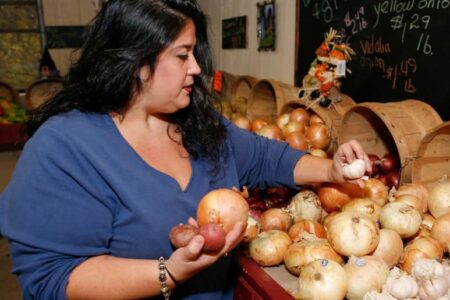
Share On Social!
Hollin Meadows Elementary School, part of the Fairfax County Public Schools in Virginia, has dedicated leaders and parents who value student health.
A few years ago, they started a vegetable garden.
Since then, thanks to the leadership of parent Shawn Akard, the school has: developed more gardens; brought in an “outdoor education coordinator” to oversee the gardens and programming; and helped students learn to grow and value new healthy produce.
The Issue of Nutritious School Food
Awareness: Shawn Akard, a PTA member and mother of a student at Hollin Meadows Elementary School in Alexandria, Va., appreciated the healthy changes going on in her district, Fairfax County Public Schools (23% Latino).
She wanted to get involved.
Learn: Around 2006, she talked with other parents to get ideas on how to get kids more healthy food and physical activity.
They came upon the idea of a school garden.
But not just any garden—a vegetable garden. They envisioned hands-on activities that could teach kids about plant life and healthy eating.
To start learning, Akard visited the American Horticulture Society (AHS), a non-profit organization in Alexandria to learn more about gardens and their functionality in schools. They showed her gardens with thriving plants and gave her resources on how to successfully create the gardens she wanted.
She began to explore how to fund a garden, too.
She also worked with a local garden center to get guidance when the time came on planting at the elementary school itself.
The local garden center also agreed to continue answering any questions she had, and said they would offer reduced material prices for a school garden.
Frame Issue: Akard then began to develop a plan and volunteer her time to get a vegetable garden at Hollin Meadows in 2006.
She was able to secure a small math-and-science grant with to start the garden.
A Plan for More Nutritious School Food
Education Akard approached Hollin Meadows Principal Jon Gates to pitch how the gardens could be developed and maintained and used by students and classes to teach students about plants and nutrition.
Gates recognized the potential and supported her effort immediately.
However, concerned that the activity might prove to be a short-term effort, he gave Akard permission to pilot-test the planting of a few small garden beds with her grant money to see how the gardens would be used and maintained.
Mobilization: Akard began to gather other parents and teachers to volunteer to work on planting the first garden beds at the back of the school, between two buildings.
Each grade would have its own garden bed.
Akard worked with the teachers to find out how to use the gardens in the classroom curriculum. She wanted to take lessons they were learning inside, and bring them outdoors. The gardens would allow the school to incorporate nutrition education into classroom learning, and introduce students to new vegetables.
Debate: As they began to plant garden beds and make lesson plans, Akard and other volunteers realized that they had some challenges to overcome. The original math-and-science grant helped them start the garden, but they would need more money for maintenance.
Hollin Meadows also met some resistance from the school district, finding that they did not entirely support the project because of sustainability issues. Many school gardens are planted with grant money, but once they lose financial support, they become overgrown and unkempt.
Akard was determined for this not to happen with the few gardens they had, so she began to plan for ways to raise money and keep the gardens successful.
Enacting a Plan for More Nutritious School Food
Activation: To help with maintenance issues, she recruited parents who could bring their kids to volunteer to work at the garden over the summer.
This allowed parents who could not volunteer during school time to get involved with Hollin Meadows.
“Folks who may not have been as comfortable coming to the school to volunteer during academic opportunities, now felt comfortable coming to garden activities. You see families you don’t see during other times,” Gates said. “It’s been a nice way to connect the community with the school and have it feel like somewhere they belong too.”
Akard also called on the Hollin Meadows PTA for additional support.
The PTA, which was regularly apprised about the garden project by Akard, agreed to donate money.
Akard and the garden volunteers also hosted an Earth Day plant sale to raise money for the gardens and bring more people to the school to see the thriving vegetable gardens.
Frame: After a successful first year of hard work by Akard and the many other volunteers, Akard and school officials believed the gardens had the potential to expand and become a sustainable learning tool for students at Hollin Meadows.
But a garden expansion would require a full-time coordinator.
Gates considered the possibility of hiring an “outdoor education coordinator” to lead the garden projects and their growth, organization, and upkeep.
Change: In 2007, Gates created a budget item for the school gardens that allowed him to hire Akard as the “outdoor education coordinator” for Hollin Meadows.
As coordinator, Akard would work with teachers to plan garden lessons, schedule time for classes to work in gardens, find recipes for vegetables being grown in the gardens, manage materials, and find new ways to utilize garden space at Hollin Meadows.
Implementing a Plan for More Nutritious School Food
Implementation: Having a dedicated outdoor education coordinator led to a successful second year in the Hollin Meadows school gardens.
That year, they built more than 15 new garden beds and continued to utilize them for hands-on learning.
One of the various ways the gardens are used in lessons is for kindergarteners’ Peter Rabbit gardens.
After reading Beatrix Potter’s book Peter Rabbit in class, kindergartners plant radishes, the same vegetable Peter Rabbit eats from Mr. McGregor’s garden. With the help of teachers and volunteers, students plant the seeds, water them, watch them grow, and harvest the radishes.
Next, older students help make a recipe Akard finds, Radish Relish for the Peter Rabbit gardens, so the kids can all try a vegetable in a creative, tasty way. Students are introduced to new vegetables and plants to teach them about healthy eating, and they get to take the recipes home to share with their families.
Teachers, parents, and students love the gardens.
“It was easy to implement it in that way because it wasn’t an idea that folks were resistant to or didn’t see the value in,” says Gates.
Sustainability: Akard and other garden volunteers continued to apply for garden grants as they found them online to supplement the school’s outdoor education coordinator budget item.
Hollin Meadows also began to get attention for their extensive gardening program, and started doing garden tours for guests and other schools. These tours allowed other schools and community members to see their success and learn from them.
Gates said the gardens “define our school.”
“When anybody thinks of our school or has heard about us they say ‘Oh you’re the school with the gardens!’” he said. “The very fabric of what we do throughout our school day in so many aspects, in science, social studies, language arts, and math comes from learning through our gardens.”
Akard served as outdoor education coordinator for six years before moving out of the United States in 2013.
Gates moved ahead to hire a new coordinator.
With the help of Akard, Gates chose Jen Finnegan, who had been a parent volunteer in the garden since its first beds were planted, as the new coordinator.
They believed Finnegan wouldn’t just maintain Akard’s work, but also add new ideas.
Finnegan works hard to ensure all students get a chance to learn more about healthy eating through the plants they grow themselves.
She said this can especially help students who are still learning English.
“The gardening aspect can touch on, a lot of the kids who are ESL get something they recognize and can make a connection,” Finnegan said.
Gates said the gardens have begun to bring more families from different backgrounds because of the volunteer opportunities over the summer.
“We are finding ways to engage all of the families in our school; finding common experiences and common ground,” Gates said. “One of the things we’ve learned is growing, planting, and working outside is something that exists in everyone’s [background].”
Explore More:
Healthy FoodBy The Numbers
1
Supermarket
for every Latino neighborhood, compared to 3 for every non-Latino neighborhood
This success story was produced by Salud America! with support from the Robert Wood Johnson Foundation.
The stories are intended for educational and informative purposes. References to specific policymakers, individuals, schools, policies, or companies have been included solely to advance these purposes and do not constitute an endorsement, sponsorship, or recommendation. Stories are based on and told by real community members and are the opinions and views of the individuals whose stories are told. Organization and activities described were not supported by Salud America! or the Robert Wood Johnson Foundation and do not necessarily represent the views of Salud America! or the Robert Wood Johnson Foundation.



